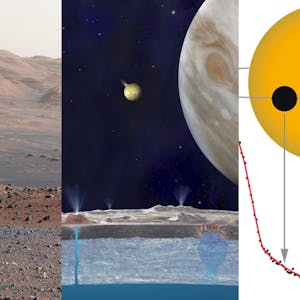Embark on a fascinating journey through the solar system with "The Science of the Solar System" course. Delve into the realms of physics, chemistry, biology, and geology to unravel the mysteries of Mars, the outer solar system, and beyond. This advanced-level course offers a comprehensive understanding of planetary exploration, habitability, and the latest scientific advancements.
Engage in critical thinking through thought-provoking quizzes and a rewarding final exam. Discover the science behind water on Mars, the insides of giant planets, big questions from small bodies, and the potential for life in our solar system and beyond. Whether you're a science enthusiast or a budding astrophysicist, this course will expand your knowledge and inspire your curiosity about the wonders of the cosmos.
Certificate Available ✔
Get Started / More Info
Explore the Science of the Solar System course modules, covering topics from water on Mars to the insides of giant planets and the potential for life in our solar system and beyond.
Delve into the mysteries of Mars in Module 1, exploring early views, water discovery, Martian geology, and the search for habitable environments. Engage in thought-provoking quizzes and discussions on Mars' intriguing features.
Module 2 ventures deeper into Mars exploration, unraveling the planet's surface features, climate cycles, and geological history. Discover the secrets of Martian glaciers, subsurface water, and the evolution of the planet's interior.
Continue the journey with Module 3, which delves into the evolution of Mars' interior, mineral identification, and groundbreaking discoveries from the Opportunity and Curiosity rovers. Uncover the enigmatic history of water on Mars through captivating lectures and engaging quizzes.
Unravel the mysteries of giant planets in Module 4, exploring the internal structures, magnetic fields, and atmospheric compositions of Jupiter and other colossal celestial bodies. Engage in quizzes and discussions on the formation and properties of these immense gas giants.
Module 5 investigates the formation of giant planets, hot Jupiters, exoplanet spectroscopy, and future exploration missions. Dive into the densities of hot Jupiters, the Kepler mission, and the groundbreaking discoveries from the Juno spacecraft.
Explore small bodies in Module 6, uncovering the formation of comets, meteorites, asteroids, and the Oort cloud. Engage in discussions on asteroid hazards, the Kuiper belt, and the intriguing properties of dwarf planets and their dynamical instabilities.
Module 7 delves into the captivating world of small bodies, exploring asteroid compositions, hazards, and the dynamics of the Kuiper belt. Embark on an exploration of dwarf planets, dynamical instabilities, and the intriguing phenomena of the Grand Tack and Planet Nine.
Enter the realm of potential life in Module 8, examining the history of life on Earth, the search for life on Mars, and the potential habitability of the Jovian moons. Engage in thought-provoking discussions on alternative energy sources and the detection of exo-life.
Conclude the course with Module 9, as you explore the potential for life on other celestial bodies, including Europa, Enceladus, Titan, and exoplanets within habitable zones. Engage in discussions on detecting exo-life and future missions to uncover life in the solar system.
Prepare for the final exam with Module 10, delving into bonus topics such as the formation of the moon, Sedna, seasons on Titan, and the intriguing story of Pluto. Enrich your understanding of the solar system's fascinating history and scientific discoveries.
Spacecraft Dynamics and Control provides comprehensive training in kinematics, kinetics, and nonlinear control for spacecraft motion, with a focus on achieving precise...
This course equips you with the skills to program precise spacecraft orientation and achieve specific aiming goals. You'll cover nonlinear stability, Lyapunov theory,...
Mécanique de Newton is a comprehensive course covering Newtonian mechanics, including kinematics, dynamics, and oscillations. It provides foundational knowledge...
Learn about modern topics in condensed matter physics, including superconductivity, fractionalization, topology, and non-equilibrium phases.